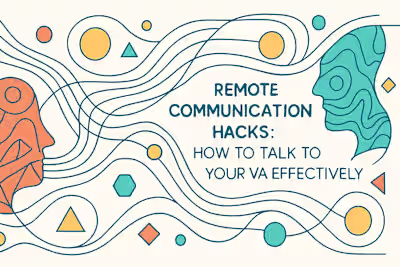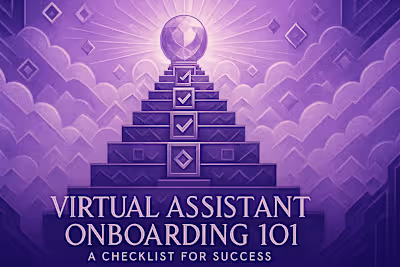Delegate, Don't Dictate: How to Build Trust with Your VA and Avoid Micromanagement

Delegate, Don't Dictate: How to Build Trust with Your VA and Avoid Micromanagement
Understanding the Dangers of Micromanagement
The Impact on Your VA
The Impact on You and Your Business
Strategies for Effective Delegation and Building Trust
Focus on Outcomes, Not Process
Start Small and Expand
Establish Clear Guardrails and Checkpoints
Fostering a Culture of Autonomy and Ownership
Encourage Initiative and Problem-Solving
Provide Regular, Constructive Feedback
Recognize and Reward Good Work
Conclusion
References
Delegate, Don't Dictate: How to Build Trust with Your VA and Avoid Micromanagement
The urge to oversee every detail can be strong, but micromanagement is a poison pill for productivity and trust in a remote working relationship. To truly leverage the benefits when you hire a virtual assistant, you must shift from dictating tasks to delegating outcomes. Building a foundation of trust empowers your VA, fosters innovation, and frees you to focus on high-level strategy. This requires clear communication and is especially critical when managing teams across different time zones.
Think about it this way: you hired a virtual assistant to save time and grow your business, not to create another full-time job managing someone else. Yet many entrepreneurs fall into the micromanagement trap without even realizing it. They send dozens of messages throughout the day, request constant updates, and redo work that was already completed satisfactorily. Sound familiar?
The good news is that breaking free from micromanagement isn't just possible—it's essential for your success. When you learn to delegate effectively and build genuine trust with your VA, something magical happens. Your stress levels drop. Your productivity soars. And perhaps most importantly, you create a partnership that can transform your business.
Understanding the Dangers of Micromanagement
Micromanagement stems from a lack of trust and a need for control. In a remote setting, it manifests as constant check-ins, overly detailed instructions, and reworking every deliverable. This behavior is counterproductive and has serious negative effects.
You might think you're being helpful by providing step-by-step instructions for every task. Or maybe you believe those hourly check-ins show you care about the work. But here's the truth: micromanagement slowly destroys the very relationship you're trying to build.
Picture this scenario: Sarah, a business owner, hires a VA named Marcus to handle her social media. She sends him 15-page documents detailing exactly how to write each post. She messages him every hour asking for updates. She rewrites his captions before posting them. Within two months, Marcus resigns, and Sarah is back to square one—frustrated and overwhelmed.
The Impact on Your VA
Micromanagement leads to increased stress, decreased confidence, and a lack of motivation. It stifles creativity and problem-solving, as VAs become hesitant to take initiative for fear of making a mistake.
When you hover over every decision, your VA starts second-guessing themselves. They stop suggesting improvements because they assume you'll override them anyway. Their work becomes mechanical rather than thoughtful. Instead of a proactive partner, you end up with someone who simply follows orders—and not very enthusiastically.
I've seen talented VAs lose their spark within weeks of working with a micromanager. They go from excited contributors to clock-watchers who do the bare minimum. Their best ideas stay locked away because they've learned that thinking outside the box only leads to criticism.
The emotional toll is real too. Constant scrutiny creates anxiety. Your VA might dread opening their messages, knowing another round of nitpicking awaits. This stress affects their performance, creating a vicious cycle where increased mistakes justify even more micromanagement.
The Impact on You and Your Business
For the manager, it leads to burnout and becomes a bottleneck, as everything must pass through you. It prevents you from focusing on strategic work and ultimately slows down the entire workflow.
Let's be honest—if you're spending hours managing your VA, you're not saving time. You're creating a second job for yourself. Every minute spent rewriting their work or explaining tasks in excruciating detail is a minute stolen from growing your business.
Micromanagement also creates dangerous dependencies. What happens when you're sick or on vacation? If your VA can't make decisions without you, your business grinds to a halt. You've essentially created a single point of failure—yourself.
The financial impact hits hard too. While you're busy micromanaging a $25-per-hour task, you're neglecting the $500-per-hour strategic work only you can do. You're paying someone to help you, then spending your valuable time helping them. It's like hiring a chef and then standing in the kitchen telling them how to chop onions.
Strategies for Effective Delegation and Building Trust
Trust is not given; it's built through consistent actions and clear communication. The key is to provide your VA with the autonomy they need to succeed while maintaining alignment on goals.
Building trust doesn't happen overnight. It's a gradual process that requires patience and intentionality. But when you get it right, the payoff is enormous. Your VA becomes a true partner who anticipates your needs and delivers results that often exceed your expectations.
The secret lies in creating systems that promote independence while maintaining quality. It's about finding that sweet spot between abandonment and micromanagement. You want to provide enough guidance to ensure success without suffocating creativity and initiative.
Focus on Outcomes, Not Process
Define what a successful outcome looks like, but give your VA the freedom to figure out the best way to get there. This shows you trust their expertise and problem-solving skills.
Instead of saying "Write a blog post using this exact template and follow these 27 steps," try "I need a 1,000-word blog post about email marketing that drives newsletter signups. Our audience struggles with open rates, so focus on practical tips they can implement today."
See the difference? The second approach respects your VA's intelligence and experience. It acknowledges that they might have insights or methods you haven't considered. Maybe they know a better tool for research. Perhaps they have a more efficient workflow. By focusing on the destination rather than dictating the route, you open the door to innovation.
This approach also speeds up the work. Your VA doesn't need to wait for your approval at every step. They can use their judgment, make decisions, and deliver results faster. When questions arise, they're strategic ones about goals and priorities, not tactical ones about formatting and process.
Start Small and Expand
Begin by delegating simpler, low-risk tasks. As your VA successfully completes them and demonstrates reliability, you can gradually hand over more complex and critical responsibilities.
Think of trust-building like training for a marathon. You don't start with 26 miles on day one. You begin with a short run around the block. Similarly, don't hand over your entire email marketing strategy in week one. Start with something manageable, like scheduling social media posts or organizing your inbox.
Here's a practical progression: Week one, delegate data entry or research tasks. Week two, add content creation for social media. By month two, they might be drafting blog posts. After three months of consistent success, consider letting them manage client communications or handle project coordination.
This gradual approach benefits both of you. Your VA gains confidence with each successful task. You build trust based on actual results, not blind faith. And if something goes wrong with a small task, the impact is minimal and the lesson is valuable.
Establish Clear Guardrails and Checkpoints
Instead of constant ad-hoc check-ins, schedule regular, predictable meetings to review progress. Provide clear guidelines and documentation so your VA has the resources to work independently.
Structure creates freedom. When your VA knows exactly when you'll check in, they can plan their work accordingly. They're not constantly waiting for your input or worried about surprise inspections. A weekly 30-minute call beats random messages throughout the day.
Create a simple system: Monday morning kickoffs to align on weekly priorities. Thursday afternoon check-ins to review progress and address challenges. This predictable rhythm eliminates anxiety and promotes focused work. Between these touchpoints, resist the urge to hover.
Documentation is your secret weapon against micromanagement. Build a knowledge base with standard operating procedures, brand guidelines, and frequently asked questions. When your VA has answers at their fingertips, they don't need to interrupt you. Tools like Loom for video walkthroughs or simple Google Docs for written guides can transform your working relationship.
Fostering a Culture of Autonomy and Ownership
An empowered VA is a proactive and engaged partner in your business. Creating an environment that encourages autonomy and ownership is the ultimate antidote to micromanagement.
The best VAs don't just complete tasks—they improve processes, suggest innovations, and take ownership of outcomes. But this level of engagement only emerges in the right environment. You need to actively cultivate a culture where initiative is rewarded and mistakes are viewed as learning opportunities.
Remember, your VA chose remote work for a reason. They value flexibility, independence, and the ability to manage their own time. When you honor these values through your management style, you tap into their intrinsic motivation. They work harder not because you're watching, but because they care about the results.
Encourage Initiative and Problem-Solving
Create a safe environment where your VA feels comfortable proposing new ideas or solutions. When they encounter a problem, ask for their proposed solution before providing your own.
The magic question that transforms your relationship: "What do you think we should do?" These six words signal trust and respect. They transform your VA from an order-taker to a problem-solver. Even if their initial suggestions need refinement, you're building critical thinking skills and confidence.
Make it clear that you value their perspective. When they suggest a new tool or process, give it serious consideration. If they spot an inefficiency, thank them for bringing it up. Create a monthly "innovation session" where they can present ideas for improving workflows or expanding services.
Real example: A VA notices that customer inquiries follow patterns. Instead of just answering emails, they create a FAQ document and suggest an automated response system. This initiative saves hours weekly and improves customer satisfaction. But it only happens in an environment where thinking beyond the task list is encouraged.
Provide Regular, Constructive Feedback
Focus your feedback on growth and learning. Acknowledge successes and discuss mistakes as learning opportunities. This builds confidence rather than fear.
Effective feedback follows the 3:1 rule—three pieces of positive feedback for every constructive criticism. Start feedback conversations by highlighting what went well. Be specific: "Your email to the client was perfectly professional and solved their problem in one response" beats "good job."
When addressing areas for improvement, focus on the future, not the past. Instead of "You formatted the report wrong," try "Next time, let's use the template in our shared folder to ensure consistency." This forward-looking approach reduces defensiveness and promotes learning.
Create a feedback loop that goes both ways. Ask your VA what support they need from you. What's working well? What's frustrating? This two-way dialogue builds mutual respect and often reveals simple fixes that dramatically improve productivity.
Recognize and Reward Good Work
When your VA does excellent work, acknowledge it. Recognition reinforces positive behaviors and shows that you value their contribution, further solidifying trust.
Recognition doesn't require grand gestures. A simple "Thank you for handling that difficult client so professionally" goes a long way. Share specific examples of how their work impacted your business: "Your social media strategy increased our engagement by 40% this month!"
Consider implementing a monthly highlight where you acknowledge a specific achievement. Maybe they streamlined a process, delighted a customer, or took initiative on a project. Public recognition in team meetings or company newsletters amplifies the impact.
Financial rewards matter too. When your VA's efforts directly contribute to business growth, share the success. Performance bonuses, paid time off, or professional development opportunities show that you value their contribution beyond words. This investment in their success creates loyalty and motivation that micromanagement could never achieve.
Conclusion
Breaking free from micromanagement isn't just about changing your behavior—it's about transforming your mindset. When you shift from controlling to empowering, from dictating to delegating, you unlock the true potential of your virtual assistant relationship.
Start small. Choose one task this week to delegate completely. Define the outcome, provide the resources, and then step back. Resist the urge to check in constantly. Trust the process. When you see the results, you'll gain confidence to delegate more.
Remember, the goal isn't perfection—it's progress. Your VA might approach tasks differently than you would. That's not just okay; it's valuable. Fresh perspectives lead to innovation. Different methods might prove more efficient. By embracing these differences, you create a partnership that's stronger than the sum of its parts.
The path from micromanager to empowering leader requires courage. It means accepting that someone else can do certain tasks as well as (or better than) you. It means trusting before trust is "earned." It means focusing on your zone of genius while empowering others to develop theirs.
Your virtual assistant isn't just a pair of hands to execute your vision. They're a thinking, creative professional who can contribute meaningfully to your business growth. When you treat them as such—with trust, respect, and autonomy—you'll discover that delegation isn't about losing control. It's about gaining freedom to focus on what truly matters.
Take the first step today. Your future self (and your VA) will thank you.
References
Like this project
Posted Jun 30, 2025
Micromanagement kills productivity and morale. Learn how to build a foundation of trust with your virtual assistant, delegate effectively, and empower them for success.










